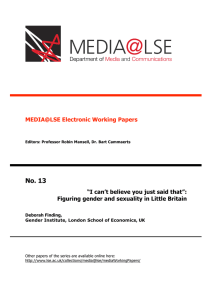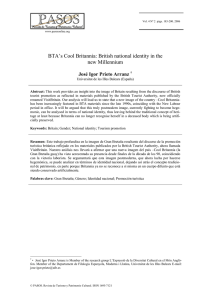Accents # Acentos en inglés
Anuncio
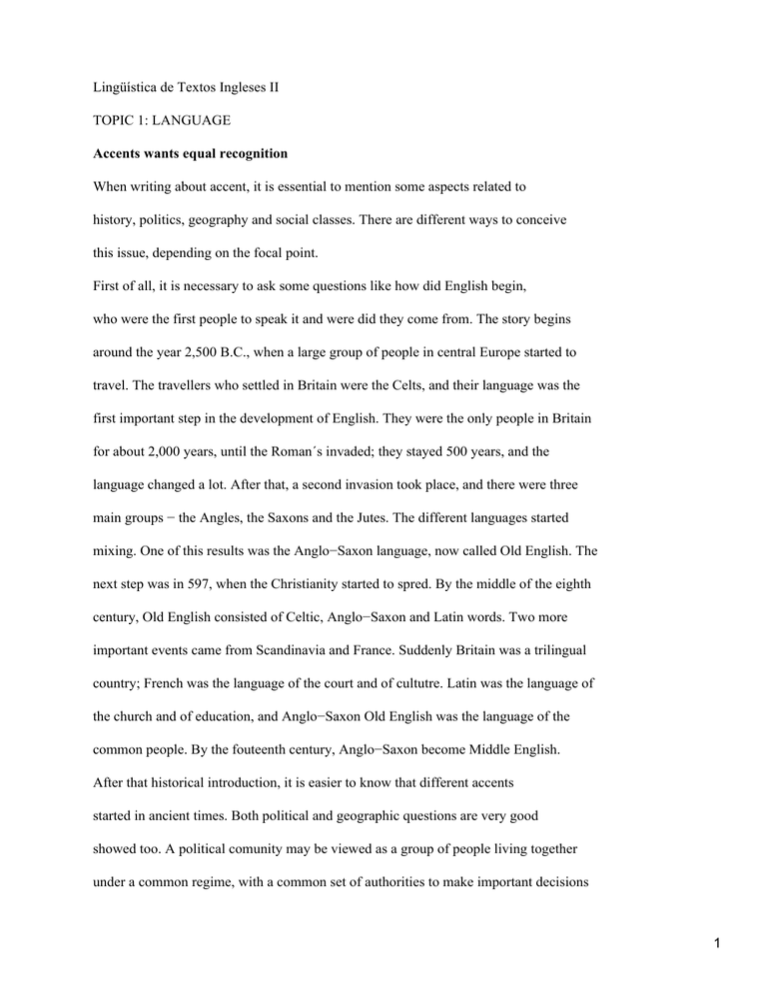
Lingüística de Textos Ingleses II TOPIC 1: LANGUAGE Accents wants equal recognition When writing about accent, it is essential to mention some aspects related to history, politics, geography and social classes. There are different ways to conceive this issue, depending on the focal point. First of all, it is necessary to ask some questions like how did English begin, who were the first people to speak it and were did they come from. The story begins around the year 2,500 B.C., when a large group of people in central Europe started to travel. The travellers who settled in Britain were the Celts, and their language was the first important step in the development of English. They were the only people in Britain for about 2,000 years, until the Roman´s invaded; they stayed 500 years, and the language changed a lot. After that, a second invasion took place, and there were three main groups − the Angles, the Saxons and the Jutes. The different languages started mixing. One of this results was the Anglo−Saxon language, now called Old English. The next step was in 597, when the Christianity started to spred. By the middle of the eighth century, Old English consisted of Celtic, Anglo−Saxon and Latin words. Two more important events came from Scandinavia and France. Suddenly Britain was a trilingual country; French was the language of the court and of cultutre. Latin was the language of the church and of education, and Anglo−Saxon Old English was the language of the common people. By the fouteenth century, Anglo−Saxon become Middle English. After that historical introduction, it is easier to know that different accents started in ancient times. Both political and geographic questions are very good showed too. A political comunity may be viewed as a group of people living together under a common regime, with a common set of authorities to make important decisions 1 for the group as a whole, with a common set of rules, applied equally to the entire population. Where a dominant group holds the position of power, any submerged group has the options of assimilation, non−mobility or group−resistance. Depending on this, the mixture of languages will be in one way or another. Appart from the mixture, which will be a new language or an old modified one, there will stand all languages, developing to new dialects. Because of this, there is evidence that a lot of different speeches must live together. In Britain the question of good speech is deeply congused. There are many regional speech−forms because of the divisions in our culture, the social classes and geographical causes. It is a mistake to assume that there is a correct form of modern English speech, which can serve as a standard to condemn all others. Public−school English, American speech−forms and many goog forms of modified regional speech are emerging and extending. The barriers imposed by dialect are reduced. However, a normal or standard English in pronunciation is very common; that is called Received Pronunciation, generally associated with the public schools, Oxford and the BBC. But there are different images of a standard forms of English. Moreover, pronunciation is infinitely variable; English, educated Scots, Irishmen, Americans, Australians and others have their own. English also offers a wide variety of accents, styles, and cranky hobby−horses. Like Lord Simon of Giaisdale said The standarizatioan should be a good manner for making it easier to learn. All languages are constantly growing and changing, and British English changes at the rate of about 250 new words coming in a year. Politics, science,comerce, finance and technology are the principal factors of these phenomenon. But the same occurs to other countries; everywhere you listen, British and American influence seeps in through gaping holes in the cultural roof. Few people get worked up at the English invasion, and few are aware of the growing power of German in the east. French people who insist on 2 seeing films in the original English and the arrival of European Disneyland are good examples of this influence. French is fighting to survive as a useful international language. There is a growing feeling that German should be equal with English and French in European Comunity affairs. German was once the common language of east European and the Austro−Hungarian Empire. Now, starten, stoppen and fighten are normal anglicisms. But the demand for German in young people is growing up as the gateway to western Europe. Besides, it is necessary to mention that feminists and other minorities have a lot to do with this linguistic influences. Franglais and Spanglish are terms that describe the influences between languages. English may be the universal language, but it is still less universal than hands and eyes. Every language evolves to meet the needs of its speakers. If its speakers are all restricted to one area and all live the same type of xistence, then few varieties of that language may be necessary. If on one hand it is widely spoken and is used by groups of people in more complex societies, then it evolves. Not two persons have an identical command of their common language; they have not the same vocabulary, there are at least some differences in pronunciation. Indeed the same individual have not the same pronunciation in all situations. No two men are identical; no two styles are the same. Linguists divide the United States speech areas into three main groups. Generally, a speaker from one area can undestand the speech from another one; some speech differences are beginning to disappear because of the influence of television. Standard English is that naturally used by most collegeeducated people. Some people learn it as their native speech, but others acquire it in their schooling or by imitation. The network English is an acceptable standard from everywhere, it is the English from the radio and television. But it is not a prestige dialect. Slang and colloquial are only acceptable in informal speech and writing. Slang is part of the current language, adding spontaneity, directness, color and liveliness, but has serious limitations too. It is often imprecise, 3 understandable. People are generally aware that the phrases and expresions they use are different from those of earlier generations. People have characteristic ways of talking. Nevertheless, distinct contexts and different listeners demand different patterns of speech from one and the same speaker. Not only that, but in many cases, the way someone speaks affects the response. Standard accent in Britain has been called received pronunciation by linguists, so this pronunciation is able to be modified. Prestige, embarrasment, social differences, comunication of ideas and feelings are some of the causes why we modify our speech form. Those different uses we can give to the language could give as the key to some better jobs, and to have better appearence in some situations. There is no hour or day when we can say that a paerson has finished learning to speak. Finally, it is only necessary to add that standard forms are used in school, in church, and in all discourse that officially concerns the whole community. All our writing is based on the standard forms. The speakers attitude toward local dialects differ somewhat in different countries. In England the local dialects have little prestige. But accents wants equal recognition, and in some way, they have. It is essential for people to undestand cultural diferences. The only thing is that we need some rules, based on a mixture of all dialects, but not according to any in particular. BIBILOGRAPHY −Inglehart, R. F. & M. Woodward (1967) Language Conflicts and Political Comunity. −Williams, R. (1989) Communications. Longman. −Quirk, R. (1989) The Use of English. Oxford: O.U.P. −Marckwardt, A. H. (1958) American English. Oxford University Press. −Nelson Francis, W. (1965) The English Language: An Introduction. W. W. Norton & Company, Inc. −Legget, G., C. David Mead & Melinda Kramer (1985) Practice Hall Handbook for Writers. 9th Ed. 4 −Bloomfield, L. (1984) Language. The University of Chicago. −Ullmann, S. (1951) Words and Their Use. Frederick Muller, London. −Newspaper and magazine articles from The Guardian, Time Magazine and GH Education. −Internet pages: Languageandculture.com 5
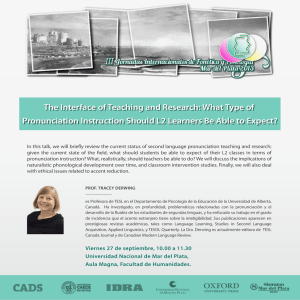
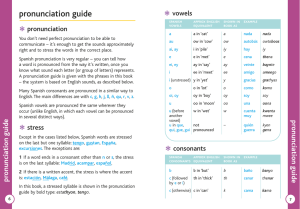
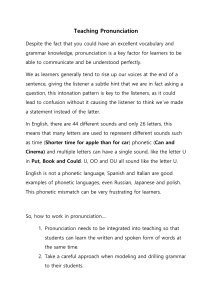
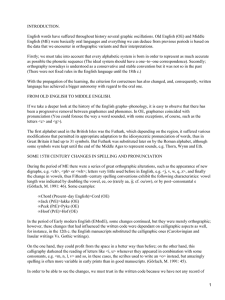

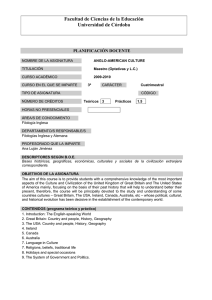
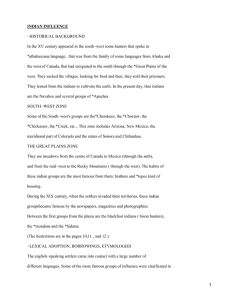
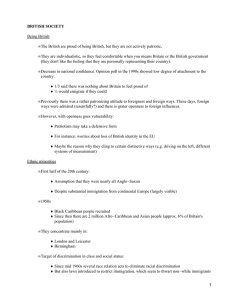
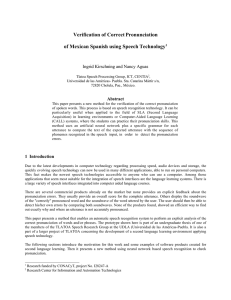
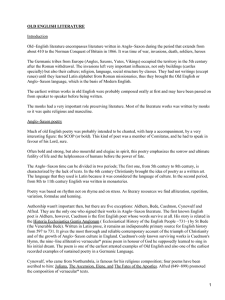
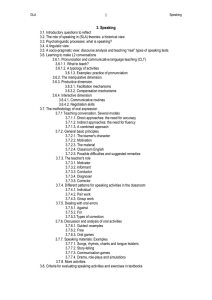

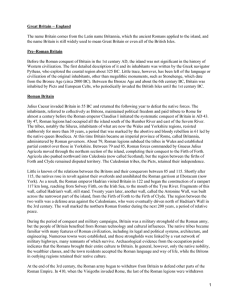
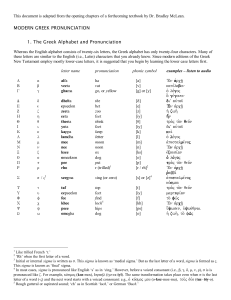
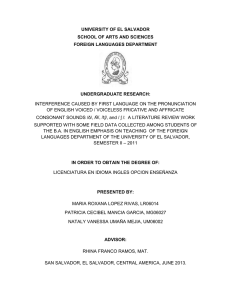


![[Win 2000 XP] Martin Hewings - English Pronunciation in Use Advanced Book with Answers, 5 Audio CDs and CD-ROM (2007, Cambridge University Press)](http://s2.studylib.es/store/data/009245652_1-41f6dabea13f83c20ec11424ebe6a75b-300x300.png)
